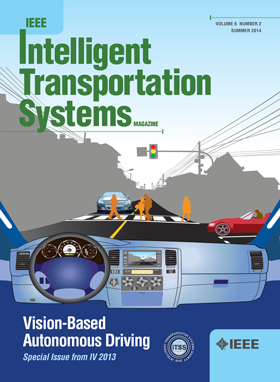FastSTI:用于时空交通数据推算的快速条件伪数值扩散模型
IF 7.9
1区 工程技术
Q1 ENGINEERING, CIVIL
IEEE Transactions on Intelligent Transportation Systems
Pub Date : 2024-10-08
DOI:10.1109/TITS.2024.3469240
引用次数: 0
摘要
高质量的时空交通数据对于智能交通系统(ITS)及其数据驱动型应用至关重要。不可避免的是,各种干扰导致的数据缺失问题威胁着数据采集的可靠性。最近对扩散概率模型的研究表明,深度生成模型能精确捕捉交通数据的时空相关性,在估算任务中具有优越性。扩散模型的一个缺点是采样/去噪过程缓慢。在这项工作中,我们的目标是在保持性能的同时加快估算过程。我们提出了一种用于时空交通数据估算的快速条件扩散模型(FastSTI)。为了在加速过程的同时获得更好的性能,我们建议应用高阶伪数值求解器。我们的方法通过在采样过程中引入预定义的方差排列策略,进一步改进了估算。在具有不同缺失数据情况的两种真实世界交通数据集(交通速度和流量)上对 FastSTI 进行评估,证明了它只需六个采样步骤就能估算出更高质量的样本,尤其是在高缺失率(60% $\sim ~90$ %)的情况下。实验结果表明,与传统方法相比,该方法的速度提高了 $\textbf {8.3} 倍。比目前最先进的模型快了 $\times $,同时实现了更好的性能。本文章由计算机程序翻译,如有差异,请以英文原文为准。
FastSTI: A Fast Conditional Pseudo Numerical Diffusion Model for Spatio-Temporal Traffic Data Imputation
High-quality spatiotemporal traffic data is crucial for intelligent transportation systems (ITS) and their data-driven applications. Inevitably, the issue of missing data caused by various disturbances threatens the reliability of data acquisition. Recent studies of diffusion probability models have demonstrated the superiority of deep generative models in imputation tasks by precisely capturing the spatio-temporal correlation of traffic data. One drawback of diffusion models is their slow sampling/denoising process. In this work, we aim to accelerate the imputation process while retaining the performance. We propose a fast conditional diffusion model for spatiotemporal traffic data imputation (FastSTI). To speed up the process yet, obtain better performance, we propose the application of a high-order pseudo-numerical solver. Our method further revs the imputation by introducing a predefined alignment strategy of variance schedule during the sampling process. Evaluating FastSTI on two types of real-world traffic datasets (traffic speed and flow) with different missing data scenarios proves its ability to impute higher-quality samples in only six sampling steps, especially under high missing rates (60%
$\sim ~90$
%). The experimental results illustrate a speed-up of
$\textbf {8.3} \times $
faster than the current state-of-the-art model while achieving better performance.
求助全文
通过发布文献求助,成功后即可免费获取论文全文。
去求助
来源期刊

IEEE Transactions on Intelligent Transportation Systems
工程技术-工程:电子与电气
CiteScore
14.80
自引率
12.90%
发文量
1872
审稿时长
7.5 months
期刊介绍:
The theoretical, experimental and operational aspects of electrical and electronics engineering and information technologies as applied to Intelligent Transportation Systems (ITS). Intelligent Transportation Systems are defined as those systems utilizing synergistic technologies and systems engineering concepts to develop and improve transportation systems of all kinds. The scope of this interdisciplinary activity includes the promotion, consolidation and coordination of ITS technical activities among IEEE entities, and providing a focus for cooperative activities, both internally and externally.
 求助内容:
求助内容: 应助结果提醒方式:
应助结果提醒方式:


